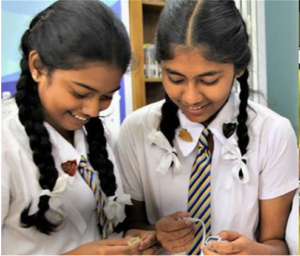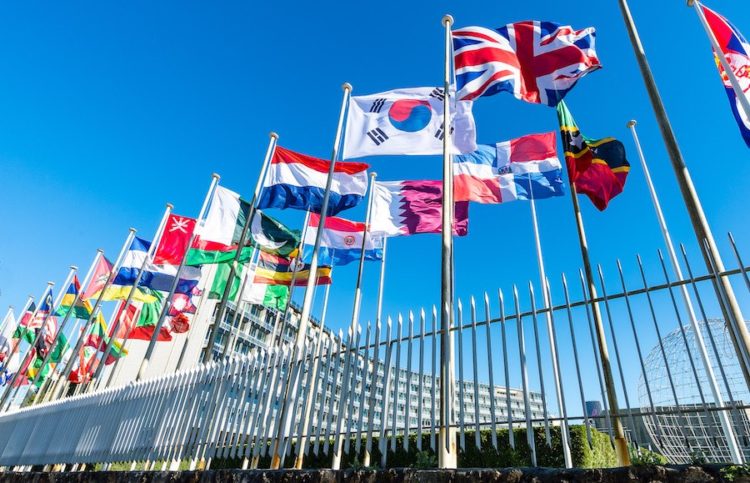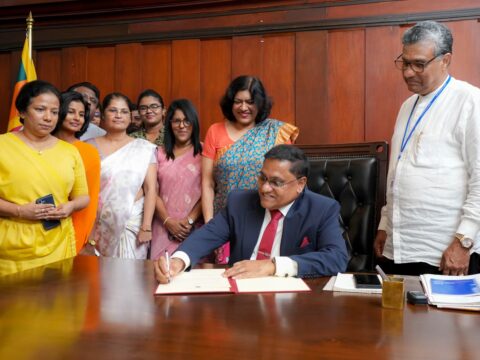PARIS: This year’s UNESCO Prize for Girls’ and Women’s Education was awarded to two laureates making a difference for girls’ education through projects that help increase young women’s participation in the emerging technology sector in Sri Lanka, and advancing access to quality primary school education for vulnerable children, including girls, in Kenya’s hardest-to-reach areas. The attribution of the Prize coincided with the International Day of the Girl Child on 11 October.

Girl Child Network of Kenya, is recognized for its project, Our Right to Learn – Reaching the Unreached, which provides access to quality primary school education for vulnerable children, including girls prevented from accessing or completing primary education. Since 2012, the project reached 51,936 children in 240 primary schools, including 25,937 girls, through education programmes, gender and disability-friendly school facilities and community-based social mobilization, transforming negative attitudes standing in the way of girls’ education.
Each of the laureates will be awarded US$50,000 to help further their work in advancing girls’ and women’s education. Shilpa Sayura Foundation has won a number of international awards for education innovation, but this is the first time Sri Lanka has won a UNESCO award for an education project.
An international jury selected the laureates from nominations submitted by UNESCO Member States and partner nongovernmental organizations. The five-member jury is appointed by the Director-General of UNESCO on the basis of their reputation in the advancement of education for girls and women, and with consideration for equitable geographical distribution and gender balance. Composed of five independent and recognized experts, the jury meets once every year to assess nominations to the Prize and presents its recommendations to the Director-General of UNESCO.
The jury consisted of Ms Aïcha Bah Diallo (Guinea), a founding member of the Forum for African Women Educationalists (FAWE); Ms Hayat Sindi (Saudi Arabia), the Chief Scientific Advisor to the President of the Islamic Development Bank and a UNESCO Goodwill Ambassador; Ms Zheping Xie (China), an author and an Associate Professor of Education at the Research Institute for Education, as well as the Deputy Director of Policy Research Office at Tsinghua University in China; Mr Maxime Forest (France), an associate researcher at CEVIPOF-SciencesPo, a senior researcher and lecturer in gender studies at SciencesPo (OFCE-PRESAGE), and a former executive member of the French High Council for Gender Equality; and Ms Gloria Bonder (Argentina), the Director for the Postgraduate Programme on Gender, Society and Policies at FLACSO University in Argentina. She also holds the UNESCO Regional Chair for Women, Science and Technology in Latin America.
Due to the ongoing COVID-19 pandemic, UNESCO celebrated the 2020 laureates through an online campaign linked to the International Day of the Girl Child. The celebration featured video messages from UNESCO Director-General Audrey Azoulay and Professor Peng Liyuan, First Lady of the People’s Republic of China and UNESCO Special Envoy for the Advancement of Girls’ and Women’s Education.
UNESCO Director-General Audrey Azoulay commented: “I would like to warmly thank the prize winners for their commitment to finding solutions for equality, which are so important in these challenging times. They are a reminder, that together, we can work to ensure that education is a common global good. Whether locally, nationally or globally all members of the education community have a role to play, as does the society at large.”
Established in 2015 by the Executive Board of UNESCO and funded by the Government of People’s Republic of China, the UNESCO Prize for Girls’ and Women’s Education has so far been awarded to ten laureates from all the world’s regions, raising awareness of good practices in girls’ and women’s education and strengthening commitments at the global level. The prize honours outstanding and innovative contributions made by individuals, institutions and organizations to advance girls’ and women’s education. It is the first UNESCO Prize of this nature and contributes directly to the achievement of universal quality education, part of the UN’s Sustainable Development Goals for 2030.
NextGen Girls in Technology increases women participation in emerging technology careers by introducing a techno-extracurricular program in schools to improve analytical, logical and creative thinking and Training university girls on-demand skills like IoT, Machine Learning, Cybersecurity and Design to bridge the skills mismatch and increase their employment opportunities. The NextGen project reached all corners of Sri Lanka from north to south offline and online in the past two years. Training 2,482 school students, 566 teachers and 418 university students, NextGen gave some girls their first technology experience to help empower their future careers.




